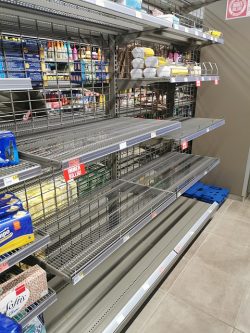The U.S. continues to not only fight the COVID-19 pandemic, it is now also grappling with some major supply chain issues that are leaving the country in chaos. Caused in part by the pandemic, disruptions to the global supply chain are responsible for gridlock in ports, material scarcity, bare shelves in grocery stores and prison …
Will Supply Chain Issues Cause Dangerous Withdrawal Symptoms?

The U.S. continues to not only fight the COVID-19 pandemic, it is now also grappling with some major supply chain issues that are leaving the country in chaos. Caused in part by the pandemic, disruptions to the global supply chain are responsible for gridlock in ports, material scarcity, bare shelves in grocery stores and prison commissaries, increasing freight prices, and a huge shortage of workers.
Not surprisingly, there are a lot of stressed workers, unhappy customers, and anxious companies watching their profits dwindling. But plenty of Americans are also faced with health-related consequences as alcohol and other pharmaceuticals are among many of the products delayed.
For people struggling with alcohol use disorder and health conditions like opioid addiction, this is having a visible impact.
A Time of Uncertainty
Jake Duke, a regional manager of Spec’s Liquor told ABC News: “We had 50 people waiting in line, just to see what we had coming in this morning because it’s a guessing game for us, just as it is for the guest.”
 He shares his frustration about this supply chain uncertainty, “They don’t know what’s coming. We don’t know what’s coming,” he said.
He shares his frustration about this supply chain uncertainty, “They don’t know what’s coming. We don’t know what’s coming,” he said.
Last week, the American Medical Association called the supply chain issues an urgent healthcare crisis, as the Food and Drug Administration announced 115 drugs are in short supply nationally. Those drugs include chemotherapy, Adderall, insulin, oxycodone, and some anxiety medications.
Heading the writing on the wall – and experiencing their own supply chain delays – pharmacists warn hundreds of medicines could be placed on backorder at any time.
So what are the implications? Well, those with substance use disorders could face some pretty severe consequences if suddenly forced to stop certain medications. And withdrawal symptoms are one of those consequences.
The Risk of Suddenly Stopping Medication
To abruptly stop using opioids, including prescription opioids that are in short supply, can cause withdrawal symptoms, including (but not limited to) flu-like symptoms, stomach ache, vomiting, diarrhea, muscle aches, anxiety, restlessness, inability to sleep, high blood pressure, runny nose, rapid heartbeat, visual disturbances, and excessive sweating.
For those struggling with severe alcohol addiction who face a lack of supply, the results could be potentially deadly. People who are used to drinking large amounts of alcohol have likely developed a dependence. If they stop drinking (also known as “going cold turkey”) they can experience seizures and delirium tremens — a life-threatening condition that can cause tremors, shaking, confusion, hallucinations and can lead to a heart attack, stroke, or even death.
Risk factors for those who stop drinking and develop delirium tremens include:
- Adult men
- People with a history of seizures
- Those with have experienced alcohol withdrawal previously
- Heavy and long-term drinkers: defined as men who drink more than 14 drinks per week and women who drink more than 8 alcoholic drinks per week.
Why is America Experiencing Supply Chain Issues?
According to the Economist, the main reason for the supply chain problem is the pandemic. After $10.4 trillion in global stimulus money was distributed, it resulted in people buying more goods and services than ever, putting a major strain on supply chains globally.
However, the pandemic also caused a serious manufacturing problem; some goods can’t be made as quickly and efficiently as others. Electronics and clothing are stuck because of industrial shortages in microchips in places like Taiwan, and the Delta variant has closed down clothing factories in other parts of Asia.
When goods are eventually sent to the U.S., we don’t have enough truck drivers to deal with the huge demand to get goods to customers. Companies are now struggling to fill these service jobs and, despite hefty signing bonuses for truck drivers, we are still in need of tens of thousands of truck drivers to make up the supply chain short fall.
Ending Supply-Related Withdrawal Symptoms
While shopping and nice-to-have items are one thing, life-saving medications and substances that people are dependent on are a much more serious problem.
 If you go to a hospital, you don’t expect to find out they’re out of a drug that can save your life. Or if you have a prescription for a medication that keeps chronic pain at bay, that you’ll suddenly be left with excruciating pain and withdrawal symptoms. So what’s the answer?
If you go to a hospital, you don’t expect to find out they’re out of a drug that can save your life. Or if you have a prescription for a medication that keeps chronic pain at bay, that you’ll suddenly be left with excruciating pain and withdrawal symptoms. So what’s the answer?
According to the Harvard Business Review, the U.S needs to reimagine its pharma supply chain. They say we’re in this situation because of a poorly designed global supply chain, despite relying on it for our nation’s most essential medical needs. While it’s an intolerable, and potentially dangerous situation for millions of Americans, they say it need not be this way if we fulfill the production of vital medicines within the U.S. instead of abroad.
The U.S. is too dependent on global production and supply of these medicines. When something goes wrong, like a pandemic, we’re left struggling to meet the needs of our nation.
The answer, HBR says, is to stop relying on China and India for medicine materials — where 80 percent of active medicine ingredients come from — and start making these medicines in the U.S.
If you or someone you love is experiencing a substance use disorder, help is available. Call 800-934-1582(Sponsored) today.
Images Courtesy of Pixabay
the Take-Away
